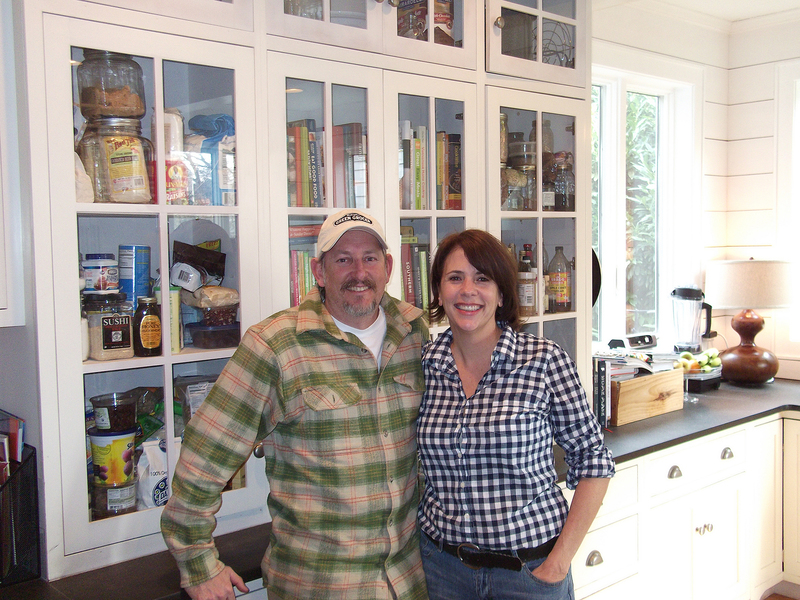Washington's Green Grocer expands to Cape Region
Washington's Green Grocer has expanded and is delivering groceries to homes in Sussex County.
Founded by Lisa and Zeke Zechiel 18 years ago, the company delivers regularly to Cape Region residents. The owners, who moved to Lewes nearly a decade ago, say they will work with local farmers and growers this year so their deliveries will include locally grown food.
Mariah and Sam Calagione, founders of Dogfish and friends with the Zechiels, sparked the expansion when they asked for food delivery at the brewery in Milton. Other residents soon signed up, and the Zechiels decided to expand home delivery to Delaware.
“It really took off from there and has been steadily growing,” Lisa said. “We are now hoping to become a food hub for restaurants and chefs, as well as delivering fresh food to residents.”
Produce is now packed outside Washington, D.C., but the couple plans to lease warehouse space, so local produce can be packed for delivery. They have hired additional delivery drivers to accommodate local demand.
“We want to emphasize Delaware growers and are hoping to build up our relationships to work with a lot of them,” Zeke said.
“We are finding new ways to get local products to local people,” Lisa said.
Beginning of a mission
A chef by trade, Lisa met Zeke, a nightclub manager, in Washington, D.C. The couple married in 1994.
“At the time, grocery shopping was terrible,” Lisa said. “The produce department was terrible. We wanted to be able to access the kind of produce restaurants were getting.”
The couple formulated a plan to provide quality produce for home delivery, talked to produce suppliers, met with growers and started Washington's Green Grocer.
Their motto is, "We're proud to sell you a lemon."
Lisa remembers coming home from the restaurant where she worked to a blinking answering machine. The pair would sit down and take down orders and messages from customers.
“We used to do a dance for two new customers,” Lisa said.
Now the business delivers to nearly 1,800 customers from D.C. to Delaware.
The answering machine is gone; orders are now placed online. Customers can select a local-only box, an organic-only box or a mixed box. Customers in Delaware receive boxes every Tuesday.
“People like to have the choice of where their produce comes from,” Lisa said. “Some residents like to try to eat only local food, so we have options for them. Others prefer the mixed box because it has more variety.”
“Fifteen years ago, people wouldn't eat kale,” Zeke said. “Now they ask for it.”
In addition to local products, Lisa likes to offer exotic items such as starfruit that people may not have tried in the past. The company can also provide recipe kits, which include directions and all the ingredients needed to make dinner.
“When we started, Zeke could only find a handful of farmers who could provide items,” because many farmers in the region were not set up to sell on a larger scale, Lisa said.
The local food movement and farm-to-table campaigns have boosted income for small, local farmers, he said.
“Delaware has such a rich agricultural history, it is nice to promote that,” Lisa said.
“There's a market for local produce. We're buying,” Zeke said.
Growers, consumers connect
The couple attended the Feb. 6 First Rate-First State Summit, which brought together 140 farmers and produce purchasers in Dover.
The Zechiels connected with growers and others developing local products such as jam producers. They hope to build these relationships to buy local food and local products and deliver them right to residents in Delaware.
“Farmers can meet many different buyers, grocers, restaurants; and retailers find new local sources for their produce; and consumers ultimately get better variety, fresh from their local fields,” said Agriculture Secretary Ed Kee. “This event is core to our mission of helping farmers in our small state reach more markets and thrive economically.”
In just five years, the summit has led to many contracts for growers, said David M. Smith, a Department of Agriculture marketing specialist, who coordinated the event.
Events like this help farmers become more profitable, Smith said.
“One farm began selling to several school districts because of this event,” Smith said. “Another grower tells us that he picks up a new account here every year. This event really is about making connections and developing those important relationships, and it works.”
“It's different now because more people can make a go of it as a local farmer,” Zeke said. “I've met so many farmers who are in their 30s and providing for their families.”
Zeke said farmers today have better luck selling goods because people are more interested in local food, and because residents are more knowledgeable about local farming, thanks in part to support and outreach from state agriculture officials.
Other local produce delivery services are available, such as a community-supported agriculture delivery through Fifer's Orchards. Customers who sign up for the CSA program receive locally grown produce during summer months, but they do not select the products they receive.
Unlike CSAs, Washington's Green Grocer doesn't require a contract. Residents can order a box one week and skip the next, and they can choose not to receive items they don't like, Lisa said.
“We are really excited about bringing more options to Delaware,” Lisa said. “There are masses of great food here, we just need to make the right connections.”
For more information, go to www.washingtonsgreengrocer.com.





















































